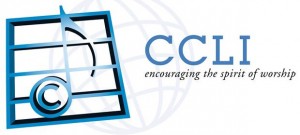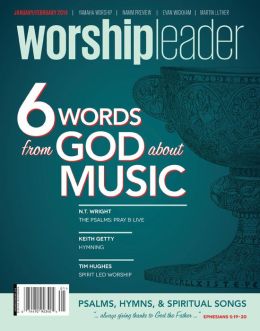
CCLI (the copyright administration company that most churches deal with) have released the top 25 worship songs that churches reported using between April – September 2012.
On their website there are lists for the US, UK, Australia and NZ. Comparing between them will reveal some interesting differences (e.g. the UK list has UK-based songwriters higher up the list, the Australian list has more Hillsong-published numbers).
Here’s the ranking of songs as reported by New Zealand churches in 2012:
| Rank |
Song Title |
Author/s |
Year |
Catalogue |
| 1 |
How Great Is Our God |
Chris Tomlin, Jesse Reeves, Ed Cash |
2004 |
Sixsteps |
| 2 |
Our God |
Matt Redman, Chris Tomlin, Jonas Myrin, Jesse Reeves |
2010 |
Sixsteps |
| 3 |
Blessed Be Your Name |
Beth Redman, Matt Redman |
2002 |
Thankyou |
| 4 |
10,000 Reasons (Bless The Lord) |
Matt Redman, Jonas Myrin |
2011 |
Sixsteps |
| 5 |
Glorified |
Shaun Griffiths |
2007 |
Integrity/Parachute |
| 6 |
In Christ Alone |
Stuart Townend, Keith Getty |
2001 |
Thankyou |
| 7 |
Here I Am To Worship |
Tim Hughes |
2000 |
Thankyou |
| 8 |
Amazing Grace (My Chains Are Gone) |
Chris Tomlin, Louie Giglio, John Newton |
2006 |
Sixsteps |
| 9 |
Come Now Is The Time To Worship |
Brian Doerkson |
1998 |
Vineyard |
| 10 |
Mighty To Save |
Ben Fielding, Reuben Morgan |
2006 |
Hillsong |
| 11 |
Hosanna |
Brooke Ligertwood |
2006 |
Hillsong |
| 12 |
Shout To The Lord |
Darlene Zschech |
1993 |
Hillsong |
| 13 |
The Stand |
Joel Houston |
2005 |
Hillsong |
| 14 |
Revelation Song |
Jennie Lee Riddle |
2004 |
Gateway |
| 15 |
The Servant Song |
Richard Gillard |
1977 |
Scripture in Song |
| 16 |
Cornerstone |
Eric Liljero, Reuben Morgan, Jonas Myrin, Edward Mote, William Batchelder |
2011 |
Hillsong |
| 17 |
Happy Day |
Ben Cantelon, Tim Hughes |
2006 |
Thankyou |
| 18 |
The Power Of Your Love |
Geoff Bullock |
1992 |
Hillsong |
| 19 |
God Is Able |
Reuben Morgan, Ben Fielding |
2010 |
Hillsong |
| 20 |
How Deep The Father’s Love For Us |
Stuart Townend |
1995 |
Thankyou |
| 21 |
Be Still |
David J. Evans |
1986 |
Thankyou |
| 22 |
This Is Our God |
Reuben Morgan |
2008 |
Hillsong |
| 23 |
I Give You My Heart |
Reuben Morgan |
1995 |
Hillsong |
| 24 |
Lord I Lift Your Name On High |
Rick Founds |
1989 |
Maranatha |
| 25 |
There Is A Redeemer |
Melody Green-Sievright |
1982 |
Birdwing Music |
I’m aware of the many limitations of reviewing a list like this (self-reporting bias, sample size, whether the report is representative of all NZ churches or favours some denominations). And other writers (e.g. here, here , here and here) have done more detailed analysis of these lists.
But here are some things I learnt from considering this list.
1. Hillsong, Sixsteps and Thankyou Music are the three biggest sources for today’s Christian worship music.

First, a fly-by view of each of these labels and artists:
- Kingsway’s Thankyou Music includes Matt Redman, Stuart Townend, Tim Hughes, Vicky Beeching and Brenton Brown.
- Sixstepsrecords includes Chris Tomlin, David Crowder, Charlie Hall, Matt Redman, Kristian Stanfill and other artists linked to Passion Church in Atlanta, Georgia.
- Hillsong Music includes Darlene Zschech, Reuben Morgan, Brooke Ligertwood (neé Fraser) and Joel Houston and other artists linked to the Hillsong network of churches.
Songs from these catalogues dominate this CCLI top 25 list, while the artists read like a who’s who of worship music for the past 20 years. Granted, there are one or two songs that disrupt this hegemony (e.g. “Revelation Song” by Jennie Lee Riddle). But once you add the global marketing reach of these publishers, I think these labels and the songwriters and artists signed to them will continue to set much of the direction of worship music in New Zealand churches that use contemporary music.
Even if you never sing any of these songs at your church, I think pastors and those responsible for choosing songs would benefit from having at least an awareness of what the wider body of Christ is singing from Sunday to Sunday.
2. New Zealand songwriters make only a small dent in the song-writing scene.

The list shows that only one NZ song (“Glorified” by Parachute Band’s Shaun Griffiths) is listed in the top 25. While there’s no biblical warrant that mandates local songs for local churches, I’d like to see more worship songs written by New Zealanders, from NZ ministry contexts.
It’s worth noting that songwriters in the past often wrote songs for their local congregations in local contexts.
For example, Henry Lyte wrote “Abide With Me” as he was dying of tuberculosis, in order to encourage the church he pastored to “to pre pare for that sol emn hour which must come to all, by a time ly ac quaint ance with the death of Christ.”
And John Newton wrote “Amazing Grace” not to accompany a theatrical release or as a response to a lightning bolt moment, but to accompany a sermon based on the text of 1 Chronicles 17:16-17 that he preached to his local church as they celebrated a new year.
Putting God’s Word to music is certainly a weighty task, which perhaps puts some of us off. Bobby Giles says it bluntly:
“We put words in people’s mouths, which they will sing in church services as well as their homes, cars and other places throughout the week as they worship God. If you don’t feel the weight of this responsibility, you should. You must.”
Despite how daunting it is, these are questions worth asking: what does your church need to sing? What about God, what about Jesus do they need to be reminded of? Where will these songs come from, and who will write them?
3. We aren’t “missing out” if we haven’t sung the top 25 in our churches.

When someone lets you know about the latest viral hit or top-selling album, it’s tempting to feel out of the loop if you didn’t know about it (I have yet to investigate this Harlem Shake thing, don’t tempt me…).
For example, the way worship leaders at our church choose songs is mainly driven by the preaching themes, the contours of the gospel message, and a desire to apply Colossians 3:16’s “sing the Word” principle.
So our church music library only has half of these top 25 songs (italicised in the list above). As a result, we’ve only sung five of them in 2012 (in bold), and at most 10 of them in the past two years.
It’s tempting for some Christians to wonder if they’re missing out by not singing the songs that everyone else is singing, as if the wisdom of the crowds solely determined what was essential for growth as a Christian.
No – what we need the most in our songs are words and melodies to “let the word of Christ dwell richly in us, teaching and admonishing one another…” (Col 3:16). If it comes from well-crafted songs from the top 25, that’s fantastic. But if it comes from from less-popular songs, from hearing the Bible read and explained, and from sharing how God’s working in our lives – that’s fantastic too, and we’re not missing out at all.
————————–
Here are some things that the CCLI top 25 list doesn’t tell us, but I wish we could have more insight on:
- What kind of church uses all (or most) of the top 25 – a Hillsong-influenced one? A church that uses exclusively contemporary music? A church whose members are predominantly from a younger demographic?
- How often are Christians singing public domain songs (e.g. traditional hymns)? Which ones have endured and which ones are not as well-known anymore? Why?
- Are there songs, themes not on the list that Christians should be singing about more? Are there themes over-represented in the songs that NZ churches sing most frequently?
What are your thoughts on looking at this list?
Do you sing most of the songs on it or only a few?
————————–







